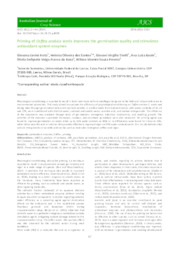Priming of coffea arabica seeds improves the germination quality and stimulates antioxidant system enzymes.
Priming of coffea arabica seeds improves the germination quality and stimulates antioxidant system enzymes.
Author(s): FROTA, G. J.; SANTOS, H. O. dos; TIRELLI, G. V.; REALE, A. L.; ROSA, S. D. V. F. da; PEREIRA, W. V. S.
Summary: Physiological conditioning is reported to result in faster and more uniform seedling emergence in the field and induces tolerance to environmental adversities. This study aimed to evaluate the efficiency of physiological conditioning on Coffea arabica L. seeds and drying rates through germination tests and enzymatic activity. C. arabica seeds from Catuaí Amarelo, with water contents of 43, 35 and 12%, were conditioned with distilled water, cathodic and anodic water, ascorbic acid, and sodium nitroprusside. The efficiency of the treatments was analyzed through tests of germination, emergence, electrical conductivity, and seedling growth. The activities of the enzymes superoxide dismutase, catalase, and ascorbate peroxidase were also measured. No priming agent was found to improve germination on seeds dried up to 12% water content, as little or no differences were found for those at 43%, while either ascorbic acid or sodium nitroprusside effectively improved vigor on 35% water content seeds. Our results indicate that sodium nitroprusside or ascorbic acid can be used as molecules to improve coffee seed vigor.
Publication year: 2024
Types of publication: Journal article
Unit: Embrapa Coffee
Keywords: Coffea Arábica
Observation
Some of Embrapa's publications are published as ePub files. To read them, use or download one of the following free software options to your computer or mobile device. Android: Google Play Books; IOS: iBooks; Windows and Linux: Calibre.
Access other publications
Access the Agricultural Research Database (BDPA) to consult Embrapa's full library collection and records.
Visit Embrapa Bookstore to purchase books and other publications sold by Embrapa.

